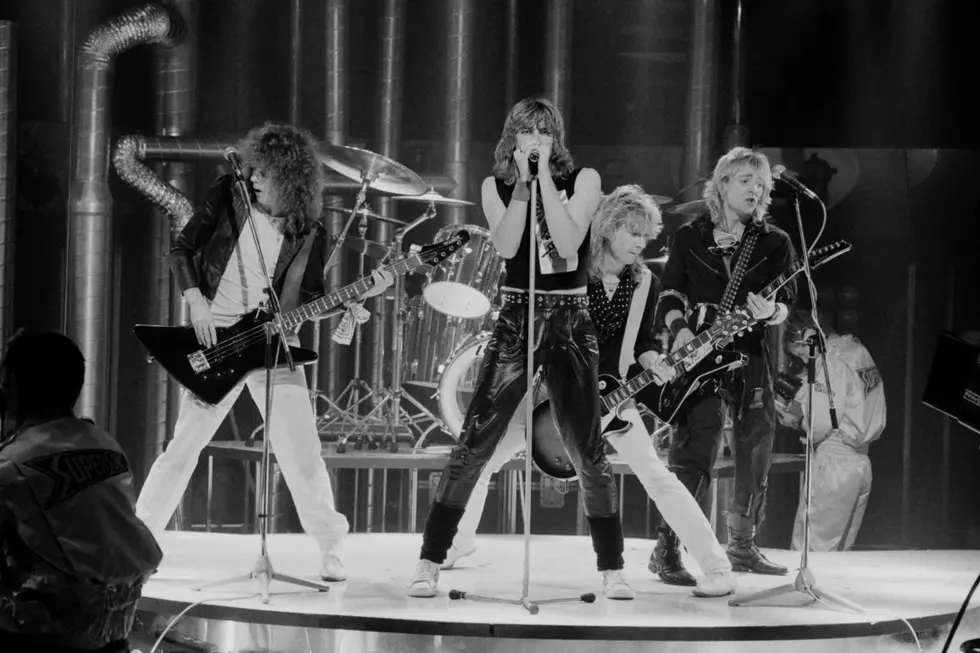
The Day Def Leppard’s Steve Clark Died
When Def Leppard earned huge mainstream success with their third album, Pyromania, that success was in no small part due to the many talents of guitar player and songwriter Steve Clark. Clark's ability to write catchy, melodic and complex hooks kept the band on the top of charts for years. But his addiction to alcohol finally caught up with him, taking his life on Jan. 8, 1991.
Born and raised in Sheffield, England, Clark got his first guitar when he was 11 years old. It was love at first sight, and he would spend most of his free time practicing, taking classical guitar lessons and becoming technically proficient early in his life.
His passion for playing guitar would take a turn toward rock after he heard Led Zeppelin, according to the memorial website Steve Clark Guitar.
“I used to listen to the radio, watch TV and hear groups all the time, and I knew that I wanted to make music, but I wasn’t sure exactly what kind of music, until I heard Jimmy Page,” he said. “I heard the first Led Zeppelin album at a friend’s house … and that was it! I had to have an electric. That was what I wanted to do.”
Clark eventually met guitarist Pete Willis, who invited Clark to try out for his new band, Def Leppard, in 1978. Clark wowed his future bandmates by playing Lynyrd Skynyrd's "Free Bird" in its entirety, including the epic solo at the end of the song.
Their timing couldn't have been better, as heavy metal was becoming wildly popular in the U.K. Def Leppard were a large part of the New Wave of British Heavy Metal that included acts such as Iron Maiden and Saxon.
After one successful EP and a year of playing shows, Def Leppard had cultivated a loyal base of fans. Their debut album, On Through the Night – along with U.S. tours opening for AC/DC, Ted Nugent and Pat Travers – brought them notoriety, as well as early criticism for seemingly forsaking British metal for radio-friendly pop.
Clark, however, never seemed to be dedicated to a purely metal sound. Like his idol Page, Clark wasn't just about sticking to one aesthetic. He idolized Page just as much for the elder's work as a producer and songwriter as he did his guitar playing. Clark was fastidious in the studio, writing and rewriting material over and over until he felt it was good enough.
"We wrote 'Armageddon It' in Dublin, and there’s not one section that survived," Clark told Musician. "The chorus wasn’t strong enough, so we changed the chorus. Then we thought the chorus is so strong, the verse is a bit weak. We rewrote the verse and said the bridge stinks. There’s not one existing note from the original, but a progression that went over about three years."
Def Leppard was headed for some rough times, though, despite its continuing success. Hysteria would become the band's biggest success to date – and Clark's last album.
That third studio projecy took three years to complete, due in part to a car crash that cost drummer Rick Allen his arm. While Allen adjusted to his loss, the rest of the band continued writing songs in the studio. Once completed, Hysteria would propel Def Leppard to a higher level of fame.
As the band's success grew, so did Clark's alcohol consumption. Guitarist Phil Collen, along with longtime producer Mutt Lange, bandmates and friends, held an intervention in 1989 after a doctor warned of the drastic harm Clark was doing to himself.
"He sat there with a cigarette taking it all in," Collen recalled in his autobiography Adrenalized. "Mutt gave him a big hug, then we all hugged him and told him that we loved him. That was a very tearful and emotional experience for all involved, especially when the doctor explained to us that about 70 percent of alcoholics who get to this level usually end up getting killed either by accident or overuse."
Clark agreed to go to a rehabilitation clinic in Tucson. While there, he met a recovering heroin addict, Janie Dean. The two decided to leave rehab and move in together, and soon Clark was back to his regular drinking habits. On January 8, 1991, Dean found Clark on their couch, motionless. He'd died in his sleep after consuming alcohol and prescription pain medication. He was 30 years old.
After his death, the rest of the members of Def Leppard recorded Adrenalize. While Clark died before he could record any parts for the album, some of his songwriting was used. Adrenalize entered the U.K. and U.S. charts at No. 1 when it was released in 1992; it would be the band's last huge commercial success.
See Def Leppard Among Classic Rock's Best Selling Albums
You Think You Know Def Leppard?
More From Ultimate Classic Rock









